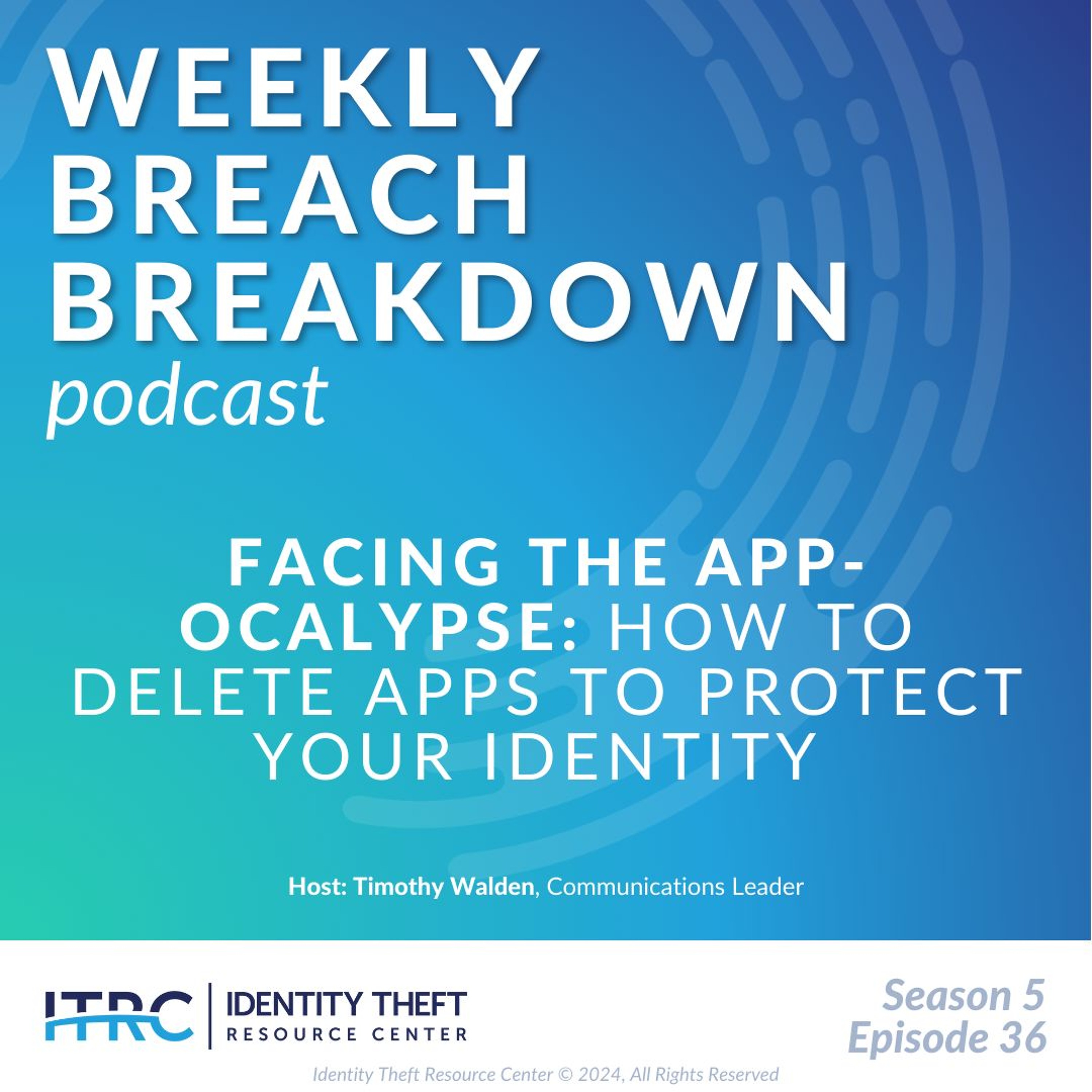Each week on this podcast, we look at the most recent events and trends related to data security and privacy. Today, we'll discuss the greatest ongoing show of global sportsmanship, the 2024 Summer Olympic games, and how identity thieves plan on trying to ruin the fun.
Show Notes
Follow on LinkedIn: www.linkedin.com/company/idtheftcenter/
Follow on X: twitter.com/IDTheftCenter
Show Transcript
Welcome to the Identity Theft Resource Center’s (ITRC) Weekly Breach Breakdown for June 14, 2024. Thanks to Sentilink for their support of the podcast and the ITRC. Each week, we look at the most recent events and trends related to data security and privacy. This week, we discuss the greatest ongoing show of global sportsmanship, the 2024 Summer Olympic games, and how identity thieves plan on trying to ruin the fun with Olympic cyberattacks.
Officials Are Prepared for Olympic Cyberattacks
The 2024 Summer Olympics in Paris are just around the corner. While the world eagerly anticipates the thrilling athletic competitions, behind the scenes, a different kind of competition is taking place – a battle against potential cyber threats.
In a recent interview, Franz Regul, the head of the team responsible for safeguarding the Summer Games in Paris, shared his certainty that Olympic cyberattacks will pose a significant threat this year. Stationed in a sophisticated operations center, his team is equipped with state-of-the-art technology aimed at detecting and repelling incoming hacking attempts. Regul's vigilance as the countdown to the Olympics progresses is a testament to the severity of the threat.
Warnings Issued for Russian Cyber Threats
In fact, according to a recent report from leading security firms, Russia-aligned actors, including intelligence agency threat actors and hacktivists, are thought to be planning cyberattacks and disinformation campaigns against organizations linked to the Paris Olympics.
Microsoft has also issued warnings about malicious Russian cyber activities, including influence operations aimed at tarnishing the International Olympic Committee's reputation in the wake of the decision to ban Russia from the 2024 Games. Threat actors tracked by Microsoft have already been identified as key perpetrators of disinformation campaigns targeting the Olympics.
2018 Winter Olympic Cyberattack
The experience of the 2018 South Korean Winter Olympics serves as a stark reminder of the real risks posed by cyberattacks. A successful attack during the opening ceremony caused widespread disruption, with the Wi-Fi network going down, the official Olympics smartphone app malfunctioning and broadcast services being impacted. However, on-site risks and cyber threats are not the only concerns in the run-up to the Games. Even fans sitting in the comfort of their homes are at risk of Olympic-related cyber and identity fraud.
How to Avoid Olympic Scams
To help keep you safe during the Games, the ITRC has a few tips to avoid any Olympic-sized scams.
- Bookmark the official Olympic website so you can visit it easily without performing an internet search that might lead to malicious criminal websites.
- Only purchase apparel from trusted websites that are authorized vendors.
- If you are going to Paris, purchase your event tickets from official sales and broker websites. Make your travel and hotel accommodation plans through well-known websites or travel agents.
- At home or in France, watch out for phishing emails. Identity criminals may look to trick you with sweepstake scams, claiming you won a trip to the Olympics or special deals that seem too good to be true. Don’t click on links or attachments in messages you are not expecting.
Contact the ITRC
If you want to know more about how to protect your business or personal information or think you have been the victim of an identity crime, you can speak with an expert ITRC advisor on the phone, via text message, chat live on the web, or exchange emails during our normal business hours (Monday-Friday, 6 a.m.-5 p.m. PT). Just visit www.idtheftcenter.org to get started.
Thanks again to Sentilink for their support of the ITRC and this podcast. Check out our last Weekly Breach Breakdown podcast, where we looked at an identity theft scheme that spanned over 30 years. We will return next week with another episode of the Weekly Breach Breakdown.
Listen On
Also In Season 5
-

The Fraudian Slip Podcast - 2025 Predictions
Welcome to the Fraudian Slip…the Identity Theft Resource Center’s podcast where -

The Weekly Breach Breakdown Podcast by ITRC - Copyrightcat - S5E37
Welcome back to the Identity Theft Resource Center’s Weekly Breach Breakdown – s -

The Weekly Breach Breakdown Podcast by ITRC - Facing the App-ocalypse - S5E36
Welcome to the Identity Theft Resource Center's Weekly Breach Breakdown for Nove -

The Weekly Breach Breakdown Podcast by ITRC - Doctor Change - S5E35
Welcome to the Identity Theft Resource Center's Weekly Breach Breakdown for Nove
